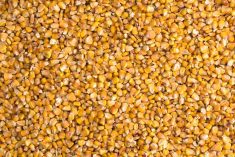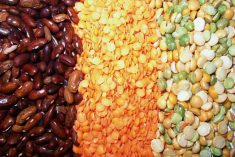Three Canadian grain growers’ groups have put their names to an international bid to help clear a regulatory path for traits produced through biotechnology, such as genetic modification (GM), in wheat.
The Grain Growers of Canada, Western Canadian Wheat Growers Association and Alberta Winter Wheat Producers Commission say they have an “accord” with wheat growers’ groups in Australia and the U.S. on “the need for the synchronized introduction of biotech wheat.”
“In recent years, we have seen wheat yields stagnate in comparison to canola, corn and soybeans,” Doug Robertson, a Carstairs, Alta. farmer and the GGC’s president, said in the three groups’ press release Thursday.
Read Also

Dryness poised to threaten Saskatchewan crops
Crops in Saskatchewan are developing in opposite directions, the province’s latest crop report said. Growing conditions in the province vary, with some areas receiving enough rain while other locations are experiencing crop stress due to hot, dry conditions.
“The application of biotechnology in wheat research could lead to the development of several traits to improve wheat yields and wheat quality,” the three groups said.
To that end, the Canadian growers said they would work with U.S. and Australian growers to “ensure the commercial introduction of biotech traits in wheat will proceed smoothly by synchronizing regulatory approvals in exporting and importing nations.”
As it now takes six to eight years for new biotech wheat varieties to reach commercial introduction, the groups said, “it is critical to signal both seed developers and policymakers now, that many farmers are eager to see biotech traits in wheat that could improve their profitability and improve food security for many countries around the world.”
Traits to improve wheat plants’ yields could include those that deal with environmental factors (drought, cold), combat weed or insect infestations, improve disease resistance or improve a plant’s use of nutrients.
And traits to improve the quality attributes of wheat could include those designed to accommodate consumers with food allergies, reduce obesity, or improve wheat-based foods’ nutritional profile, the groups said.
“Being early adopters of new biotech traits in wheat could help restore our competitive advantage,” said Kent Erickson, an Irma, Alta. farmer and chairman of the Alberta Winter Wheat Producers Commission, in the groups’ release.
“Co-ordinating our efforts with farmers in other leading-edge countries will ensure Canadian wheat producers are not left behind and instead are among the first to take advantage of this technology.”
Pressure from farm groups and other advocacy groups has so far kept any seed genetics firm from trying to register a GM wheat. Monsanto in 2004 announced it would shelve its work toward introduction of wheat varieties with its patented Roundup Ready genetics for glyphosate tolerance.
Farm groups and agencies such as the Canadian Wheat Board have previously contended that introduction of biotech wheat, without significant market acceptance or a functioning system to segregate it from conventional wheats, would jeopardize farmers’ export and domestic markets alike for the conventional crop.
But the growers’ groups speaking Thursday contend that wheat acreage in Western Canada has declined significantly over the past two decades, in part due to its declining profitability (relative to canola and other crops) and increased competition from wheat producers in Ukraine, Russia, Kazakhstan and Argentina.
“If wheat continues on a non-biotech course, then farmers will continue to devote a greater share of their acreage to biotech crops, where profitability is relatively greater, resulting in lower world wheat production than would otherwise be the case,” the groups said in a joint statement with six U.S. and Australian organizations.
U.S. groups working with the Canadian growers include the National Association of Wheat Growers, U.S. Wheat Associates and North American Millers’ Association.
Australian groups involved in this effort include the Grains Council of Australia, Grain Growers Association and the Pastoralists and Graziers Association of Western Australia.
“Irreparable harm”
Farmers who have previously warned against the introduction of GM wheats remain unconvinced. Stewart Wells, a farmer at Swift Current, Sask., and president of the National Farmers Union, said Friday that the groups now lobbying for GM wheat “don’t speak for the majority of producers.”
However, he said, “as long as companies like Monsanto have two nickels to rub together they will always be able to find groups that will lobby for their interests.”
International customers who now buy 82 per cent of Canada’s wheat crop have previously said they would stop buying if Canada were to introduce GM wheat, Wells said.
“GM wheat will kill markets,” he said. “Customers have indicated clearly they will stop buying all wheat from us: GM and non-GM alike.”
The introduction of GM wheat, he said, would inevitably lead to contamination in production and handling systems, which in turn would spell disaster for the organic wheat industry because segregation is virtually impossible.
“There is no organic canola grown in Canada because of widespread contamination from GM canola,” said Wells, an organic producer. “This has caused irreparable harm to organic growers.”















